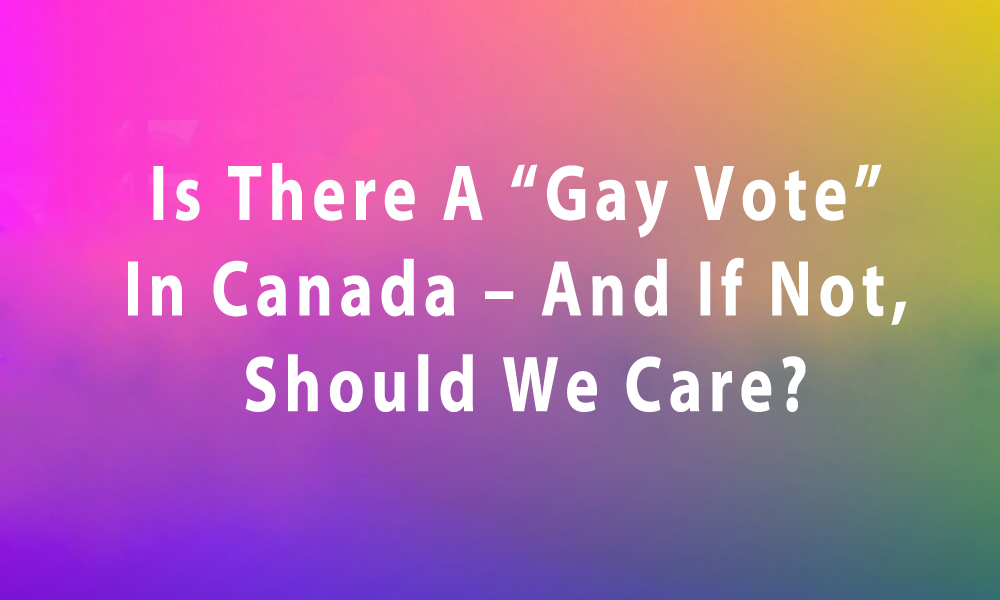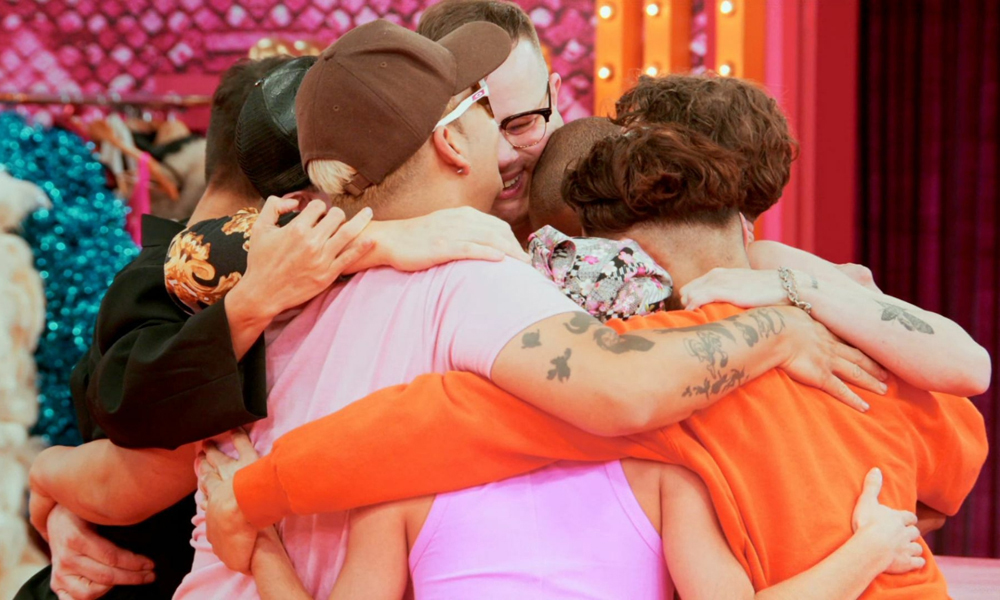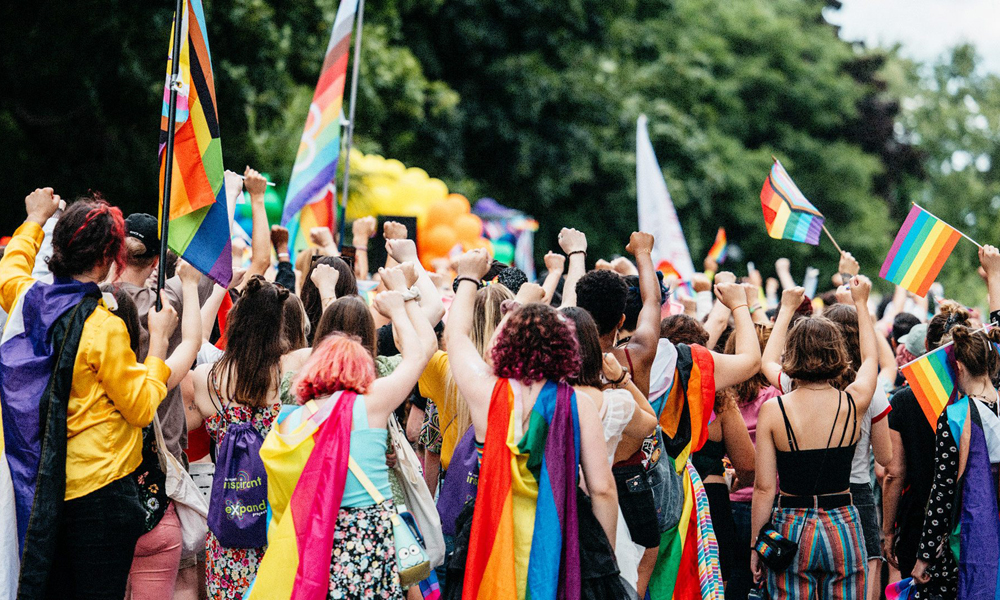Recent poll finds that LGBT issues rank second-to-last on voters’ concerns…
What is it that keeps Canadians up at night?
It’s a question that national columnist Susan Delacourt asks in the Toronto Star when she reviews Public Square Research’s recent “Canadian worry check-in.” It’s a bit of a loaded question.
You see, the poll (released in November 2017) asked 1,500 voting-aged Canadians how worried they are about their future, gauging what exactly they’re concerned about. The results aren’t particularly noteworthy. Unsurprisingly, the costs of basics like groceries and electricity rank at the top of the list, followed closely by health issues and saving enough for retirement.
Other than some partisan outliers – Conservatives, for instance, worry more about crime and immigration than their progressive peers, who fret more over the environment – it’s seemingly a no-brainer. As any pocketbook guide to psychology will tell you, humans are motivated to satisfy their immediate needs for food and shelter before considering the well-being of a broader community. Maslow’s hierarchy of needs and all that.
So what’s interesting about Delacourt’s column isn’t the worry index itself, but rather the conclusion she comes to after reading it. She, and in many ways the study itself, suggests that as we approach the 2019 federal elections, politicians should focus their campaigns on the pocketbook issues that topped the index – specifically jabbing the current Liberal government’s diversity-heavy messaging.
That’s because, she notes, trailing the list of things Canadians worry about are women’s equality, Indigenous issues and (coming in at number 22 of the 23 listed possibilities) LGBT issues.
To be fair, it’s not that Delacourt or the reps from Public Square Research claim that no one cares about the communities listed above. Rather, they use these findings as fodder for advice to political parties of all stripes – in order to win, politicians need to stick to the issues people actually worry about, and that just isn’t LGBT issues.
But that doesn’t tell the whole story, does it?
There’s a lot going through voters’ minds when they’re handed that fateful ballot. When asked in a vacuum to rank what they want to secure in life, most would likely put a stable job, good health and some money in the bank high on the list. But when asked who to put their faith behind, and whose values they trust, there’s a lot more factoring into the decision – especially for LGBT voters and their allies.
Personally, there’s not a single ballot I’ve cast where I haven’t looked into the candidates’ voting records or public statements on the LGBT community. In fact, my whole entry into politics was filtered through a queer experience. The first political campaign I volunteered for was to support a queer candidate, and when I was in the running to become the newest speechwriter for former Ontario Premier Kathleen Wynne, there was only one way I could answer the question about what I respected most about Canada’s first openly gay premier: “She’s out.”
That may sound a bit reductive, but it’s true. Before I knew anything about her time as minister of education in the late 2000s or her accomplishments following that, I knew she was breaking records and barriers as an out, lesbian political leader in Canada’s most populous province. As someone who, at the time, barely knew where I landed on the political spectrum, her obvious bravery broke through the noise. It left an impression on me that no amount of “good jobs” and “pocketbook issues” messaging that every (yes, every) politician shovels could match.
When I landed the gig and began writing for the Premier, I learned my experience wasn’t unique. Many staffers, volunteers and supporters shared similar stories of inspiration. As I made my way through Ontario politics into other offices, I learned that the same could be said for many of the then-diverse caucus members. Women, immigrants, people of colour, queer folk – we came out in droves because we saw, for once, people who had similar lived experiences as us and who spoke about protecting us.
It sounds like tribalism or a kind of identity politics that pundits like to roll their eyes at, but it’s a powerful force of mobilization. One that may not be keeping me up at night, but is certainly getting me out of bed to vote, volunteer and donate – all of which are the ultimate goals of any campaign. That potential for organization and action shouldn’t be discounted.
As a matter of fact, less than a week following Public Square Research’s poll ranking LGBT issues second-to-last on voters’ radar, Ontario’s new Progressive Conservative government became the trending punching bag after a party convention resolution was passed for debate that called gender identity an “unscientific, liberal ideology.”
Likely spurred on by the fact that this resolution came just three days shy of Transgender Day of Remembrance, the community pounced. Not just the LGBT community, but also allies and friends. They knew it was just a resolution for debate and not law, but still recognized it for what it was – a value statement erasing the real lives of trans and non-binary people and those who supported them.
After days of media questions backed by social media and pressure by LGBT organizations, Premier Doug Ford took the very rare step of killing the resolution, telling media “it’s done.” His office later clarified that he would “explore every option as Leader of the Ontario PC Party to prevent this resolution from moving forward.”
I say rare because this is a premier who cultivates a reputation for bluntness and a no-holds-barred approach to critics. The same premier who, just a few months previously, threatened to use a controversial constitutional notwithstanding clause to dance around a judge’s ruling (the ruling was eventually halted by a higher court).
I bring up Premier Ford’s unique position on the gender identity resolution not to absolve him of past misgivings about the LGBT community, but instead as an example of what happens when queer and allied communities get involved, making noise and forcing a political leader to show his hand.
After all, it’s not as though every criticized decision gets the same response. A week prior to the gender identity scandal, Ford’s government announced it was scrapping rent control. According to the worry index, one’s ability to pay rent or the prospect of losing one’s home came fifth on the list of concerns – yet the campaigns against the end of rent control have yet to pick up notable steam. This is despite the fact that unlike the resolution – which was just up for debate – the end of rent control is actually happening.
And what’s one of the few opposition campaigns that have been able to keep momentum? Reinstating the updated sex-ed curriculum, a movement that has been driven largely by – yep, you guessed it – LGBT advocates, organizations and allies.
All of this is not to say that LGBT voters can’t or don’t make political decisions based on more than their sexuality. Of course, they do. Yet much like other marginalized communities, most of us look at our interactions with public life through a queer lens. I can’t “cover the cost of basic needs” if laws don’t protect me from being fired or evicted for being gay. I can’t “care for my health or the health of people I love” if I can’t afford medications that would treat or prevent diseases disproportionately affecting my community, or if my rights as a same-sex spouse or parent aren’t recognized in the healthcare system.
So, yes, when taken out of context, “LGBT issues” may scrape the bottom of the list when it comes to what’s keeping Canadians up at night – but I would caution any politician who’d use that as a license to ignore or abandon the very real LGBT fights that are ongoing in this country. With our community’s history of activism, queering of pocketbook issues and personal championing of people who can speak to our lived experiences, LGBT voters can be a powerful ally in any political campaign.
And for those looking to campaign on anti-LGBT platforms? Well, they might actually have something to worry about.
—
KEVIN HURREN is a former speechwriter for Ontario’s 25th Premier, Kathleen Wynne, as well as a senior communications advisor for members of her cabinet. He is also the former chair of the Ontario Public Service Pride Network and works with LGBT campaigns. Currently, he’s a freelance writer based in Toronto’s gay village.

Is There A "Gay Vote" In Canada – And If Not, Should We Care?
Related Articles
RuPaul’s Drag Race All Stars Season 9 Episode 12 Recap: Grand Finale Variety Extravaganza: Part 2
The results of the lipstick vote are revealed and three final queens battle for the all star crown and title. Actress Connie Britton is a guest judge
Canvas Cabaret: A 10 Year Celebration Fundraiser Hosted By Canvas Programs
The Canvas Cabaret fundraising event in Toronto will be held on Thursday, September 26 and will toast a decade of 2SLGBTQ+ inclusion and consent education
Everything You Need To Know About Montréal’s 2024 Pride Parade
Date, time, route! Here’s how to join the crowds on Sunday, August 11, for Fierté Montréal Festival’s annual Pride Parade
Comments
1 CommentPOST A COMMENT





Janet Ritchie / 05 January 2019
Brilliant brilliant brilliant, such a wise, meaningful and insightful article and so well written.